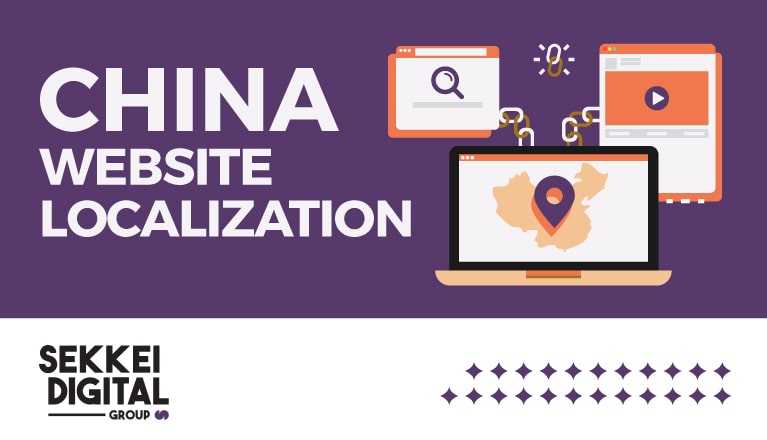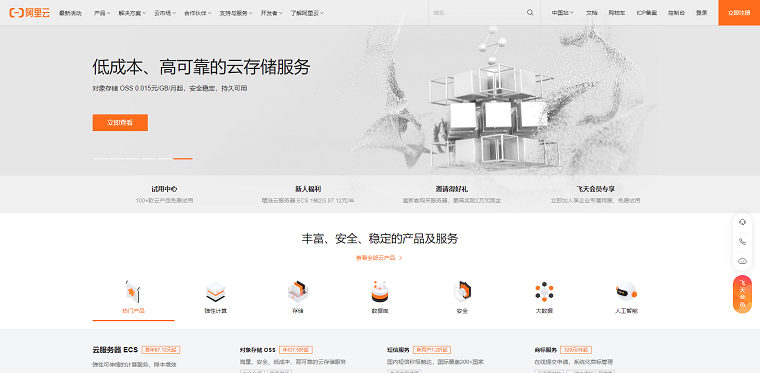Last Updated on May 10, 2024
The Chinese market has a distinct digital ecosystem. In addition to the native language, the implementation of the Great Firewall policy makes the country’s website localization process more complex and challenging for foreign businesses.
Unlike the West, Chinese consumers are more attuned to utilizing domestic platforms for their daily digital needs. These channels operate according to the local standards and laws, so your usual strategies may not work here as effectively as you’d think.
In this post, we’ll discuss the best practices for website localization in China and other tips for capturing the interest of Chinese internet users.
Why is Website Localization Important in China?
Website localization is important in China because of the Great Firewall policy. This system requires foreign company websites to undergo filtering to ensure that all the content Chinese users are consuming follows the country’s censorship laws and advertising regulations.
Without proper content optimization, your website may not be visible to your target audience in China. Unlocalized sites may also have slower operating speeds and rank lower in local search engines.
A website domain with a Chinese version is also viewed more positively by the local market. It gives the impression that your identity has been audited and that local laws apply to your company.
Hosting a .CN domain provides stability to your website, especially with China Internet Network Information Centre (CNNIC) installing auxiliary servers over five different regions.
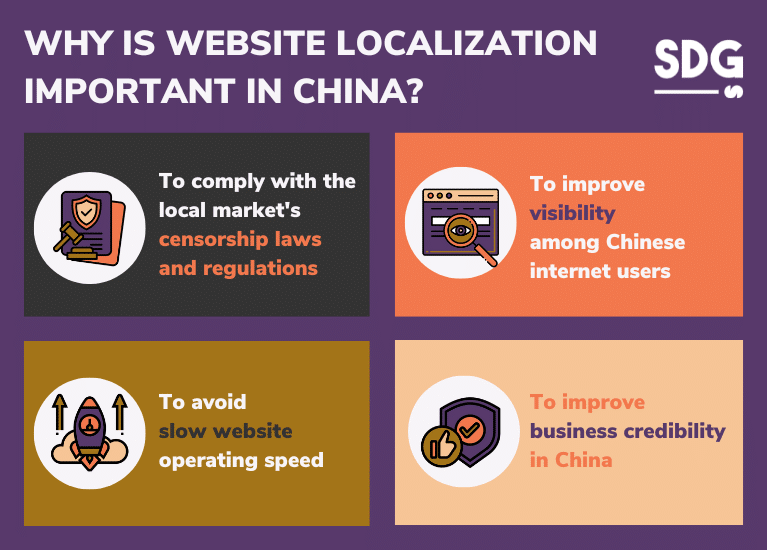
Major Requirements for Chinese Website Localization
As a foreign business seeking success in the Chinese market, you may wonder why you must undergo a tedious website localization project. Some may even think this process only involves translating the company’s online content.
However, the reality is a lot more complex than translations. Here are specific requirements you must consider to localize your website for Chinese consumers:
● Domain Name Registration
If you intend to host your company website in China, domain registration is a requirement you can’t skip. You can purchase one from popular Chinese domain providers like Alibaba Cloud and Huawei Cloud.
Foreign companies that bought domains from overseas service providers should transfer their registration to an official Chinese registrar. This process may include Real Name Validation and CNNIC documentation.
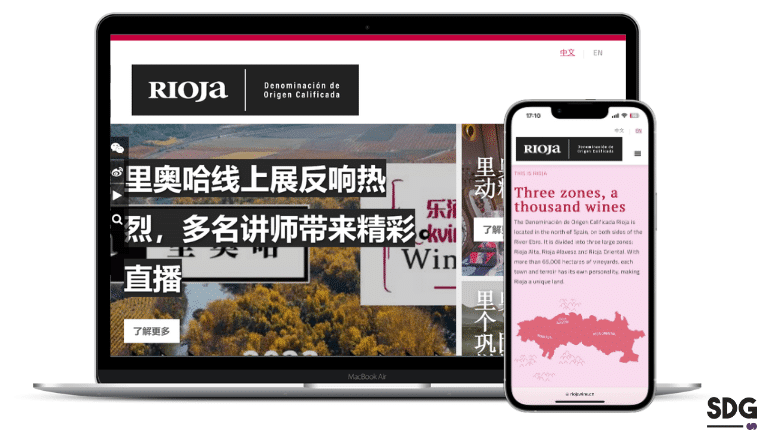
Rioja Wine’s website with a Chinese domain
CNNIC is the domain name registry responsible for administrating, operating, and maintaining the Chinese domain name system. Depending on your location and application type, the list of required documents needed to register your domain may differ:
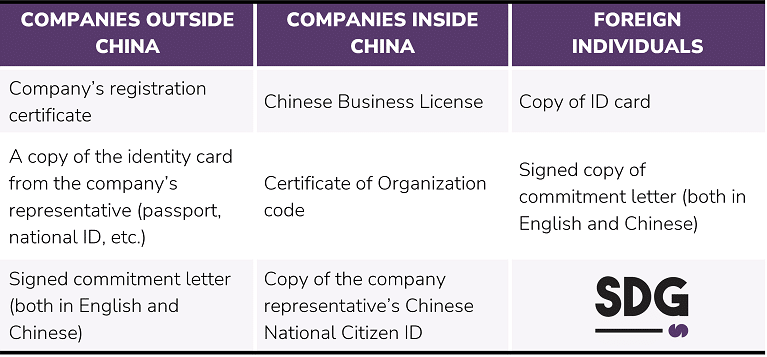
● Local Hosting Provider
After obtaining the local domain name, companies can proceed to find a reliable hosting service provider in the Chinese market. Setting up a locally hosted website will ensure that your online content will operate smoothly when viewed by local users.
Beyond the convenience of Chinese customers, hosting local websites also indicates that your business is complying with proper regulations, including data privacy and digital censorship laws.
While it’s possible for a non-locally hosted website to be visible in the Chinese markets, it can slow down your web pages and diminish the site’s performance. It also doesn’t eliminate the risk of getting banned in China’s digital landscape.
It’s worth noting that many foreign Content Delivery Networks (CDN) are banned in China. So, if you’re considering using this method to localize your website, we recommend choosing a CDN service with a reliable network within the country.
If the data is coming from a nearby server, the information requested by local users when browsing your website can be returned to them faster.
● ICP Application
The government requires obtaining an Internet Content Provider (ICP) license for websites looking to get hosted in locally This requirement can help you bypass China’s Great Firewall, as it gives your site the stamp of approval from the Chinese authorities.
Depending on your business needs, you can choose between two kinds of ICP certifications. Information-based and non-commercial websites only need to undergo the ICP Filing process. The approval only takes up to 30 days and can be filed by either companies or individuals.
Companies that intend to use their websites for e-commerce must also apply for an ICP commercial license in addition to the regular filing.
This process will allow you to receive payments online through platforms like WeChat Pay and Alipay. Besides that, it also makes the creation and management of digital advertising campaigns more seamless.
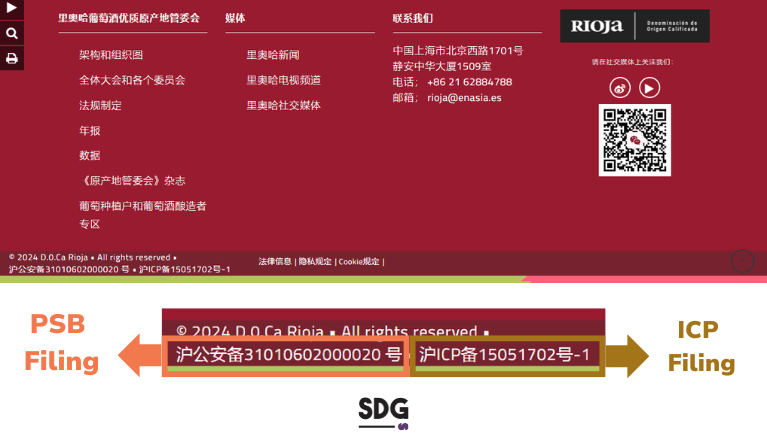
● PSB Filing
The PSB Filing or Gong’An Bei’An (公安备案) is another registration process required by the Public Security Bureau (PSB) for websites operating in specific sectors, such as news, publishing, and online gaming.
To comply, you need to submit an application detailing your website’s domain, hosting provider, and the nature of your content to the PSB. You’ll be granted a registration number upon approval, which you should prominently display on your homepage.
7 Top Strategies for Website Localization in China
1. Ensure that your website translation is on point
Translating is a huge part of website localization. Although it seems straightforward, choosing between traditional and simplified Chinese for your website content can be particularly challenging, especially for a non-native speaker.
Knowing which to use can significantly influence your audience’s perception, showing your respect and understanding of their language and culture.
● Simplified vs Traditional Chinese Translation
Historically, traditional Chinese is the standard spoken and written language in China. Over the years, it has become exclusively used in Hong Kong, Macau, Taiwan, and Guangdong provinces.
Today, simplified Chinese is the language used by 1.4 billion people. So, unless you’re targeting audiences from Taiwan, Macau, or Hong Kong, this translation type is the most recommended route to take.
Although we understand the convenience of language apps, we don’t recommend using them to translate your website content. It’s best to work with local partners who are adept with the country’s written nuances and slang.

When localizing, don’t forget that the Chinese language has formal (您) and informal (你) ways of addressing someone, which can affect the tone and reception of your content translations.
Typically, formal language is preferred in technical documents or user interfaces, while a casual tone might be better for marketing materials like mobile app promotions.
2. Align Website UI and UX with Chinese Audience Preferences
When you first visit a Chinese website, you’ll likely notice its distinct layout compared to those from the Western world. They typically feature a high density of text and links on each page.
This design choice stems from the complexity of the Chinese language, which impacts the way search engines process their result pages. As a result, local web designers pack their pages with content text and links to simplify every user’s search journey.
An example of a localized website with links and live chat integration
Although there’s a growing trend towards minimalist designs in China, a typical local user still expects to find ample information about the company and its offerings within the website.
If you ask us, striking the right balance is key. Try to maintain a clean, uncluttered design while still providing enough information to meet user needs.
When it comes to the website’s visual design, it’s best to remove dark colors. Instead, experiment with culturally resonant shades (like red or gold). Remember, the goal is to create a familiar look and feel for your target customers.
3. Include Instant Communication Options
The Chinese market is highly adept at using technology. With the country’s digital landscape rapidly evolving, your potential customers expect you to answer their queries quickly.
One effective strategy to cater to these preferences is adding a live chat customer service option on your website. Chinese users are tech-savvy, so talking to AI chatbots is not new to them.

Red Bull Chinese website with QR codes and other local communication channels
Around 70% of China’s consumer market scans QR codes for purchases and other digital needs. You can integrate this strategy to create private traffic for your WeChat official account, mini-program, or virtual storefront.
4. Optimize Content for Chinese Search Engines
While Google is the most used search engine in the world, Baidu and Bing are the platforms that reign supreme in China. These local search channels operate with distinct algorithms and ranking factors.
For example, Baidu’s system greatly favors locally hosted websites and content published in Simplified Chinese. The platform also puts a high value on keyword density and Meta Tags.
Meanwhile, websites with high authority and integrated with more media content may perform better in Bing.
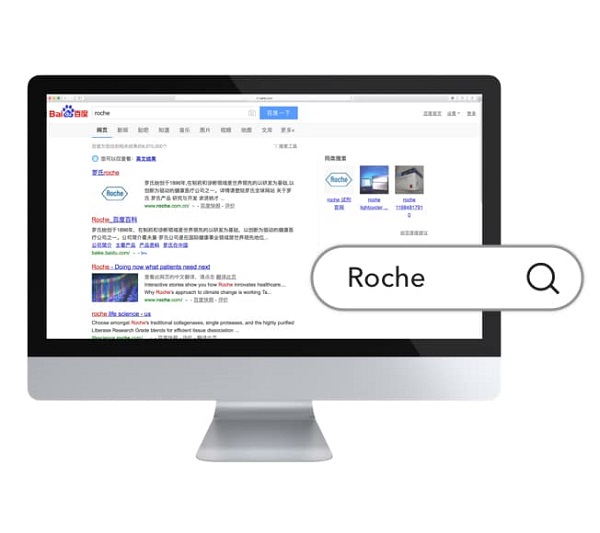
SDG’s Work With Roche: Baidu SEO Implementations
These factors are important when conducting keyword research and content optimization on your website. They determine your website’s visibility and connect you with users who are already interested and searching for terms related to your business.
5. Implement Mobile-First Strategy
Another recipe for success in China is ensuring that your website is fully operational on mobile. With over 1.2 billion people using this type of device to surf the internet, optimizing your website to suit the needs of mobile users is inevitable.
Being a mobile-first country, it’s also unsurprising that 92% of Statista’s local respondents admit to using mobile for their online purchases in the last 12 months. This data shows that not optimizing for mobile may lower your chance of sales conversion.
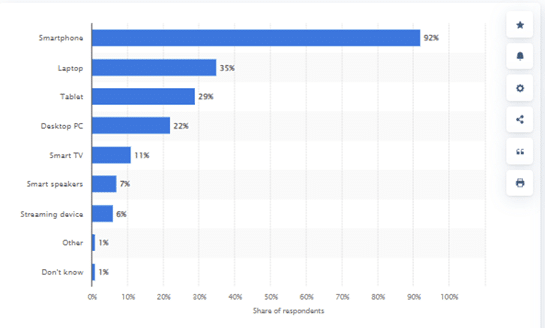
Most common devices for online purchases in China in 2023 (Source: Statista)
6. Integrate Your Site with Local Social Media Channels
China’s social network is one of the most lucrative segments in the local digital business scene, with over 74.2% of the country’s population utilizing these platforms.
As you know, Facebook and Twitter are restricted in China. So, if you’re going to integrate social links into your brand’s Chinese website, remember to include domestic platforms like WeChat, Little Red Book, Douyin, or Weibo.
WeChat is the country’s most critical social media app, with 38 billion messages exchanged daily. For businesses looking to make an impact, integrating this app into your website is a no-brainer.

L’oreal featuring their local social links on their Chinese website
7. Remove Restricted APIs
To ensure your website operates smoothly in China, you must address the compatibility of your APIs (Application Programming Interfaces) in the local digital landscape.
Due to the Great Firewall, many international services, including all Google-related ones, are blocked in China. This restriction can significantly hinder your site’s functionality and degrade the user experience.
For example, try integrating Baidu’s services instead of Google Maps or the Google Search Engine. You must also consider using platforms like Youku or Tencent Video for video content.
This adjustment not only ensures your site functions well but also better aligns with local user preferences and practices.
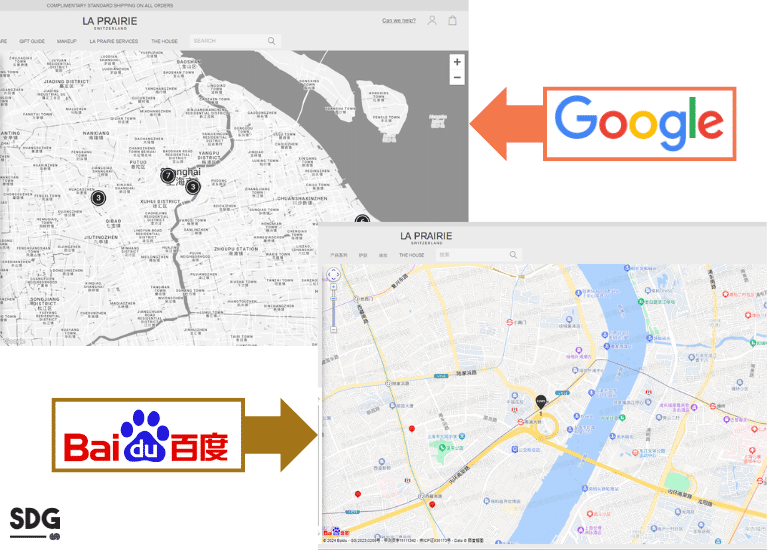
Baidu Map vs. Google Map
Quick Q&A
Why do websites get blocked in China?
Websites are blocked in China mainly due to the country’s internet regulations, which aim to control the flow of information and maintain social stability. This is done through a system known as the Great Firewall, which filters and restricts content that might be considered sensitive or harmful from the government’s perspective. As a result, both local and international websites can be blocked if they don’t comply with these regulations.
Your Trusted Website Localization Partner in the Chinese Market!
Your website is the window to your business in China. It’s important to make it highly accessible and visible to Chinese consumers, especially because these audiences are naturally tech-savvy and curious.
While it’s true that this process requires time and effort, your website localization project does not have to be complicated. With Sekkei Digital Group, you can leverage our team’s extensive industry knowledge and technical expertise to transform your site into a valuable source of traffic in the Chinese market.
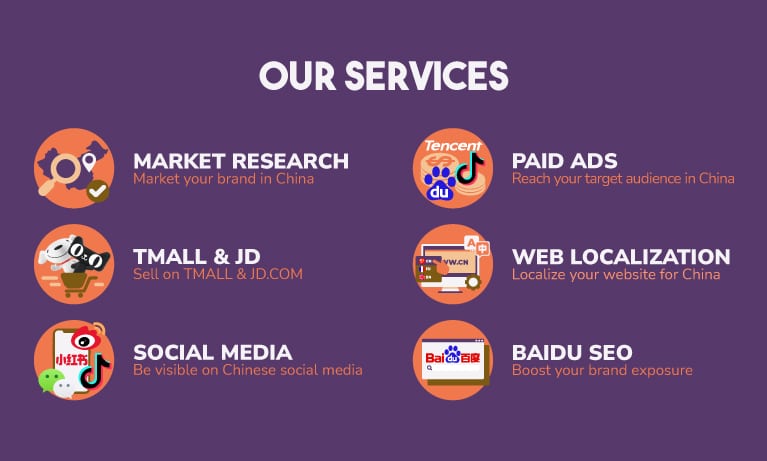
We are here to support your China Website localization project. Our seasoned experts are ready to assist you in taking your website to the next level. Let us know more about your project and how we can help.
References:
ESSENTIAL TIPS FOR CHINESE LOCALIZATION PROJECTS
Guide to Website Localization in China
Three steps to a successful website localization for China

